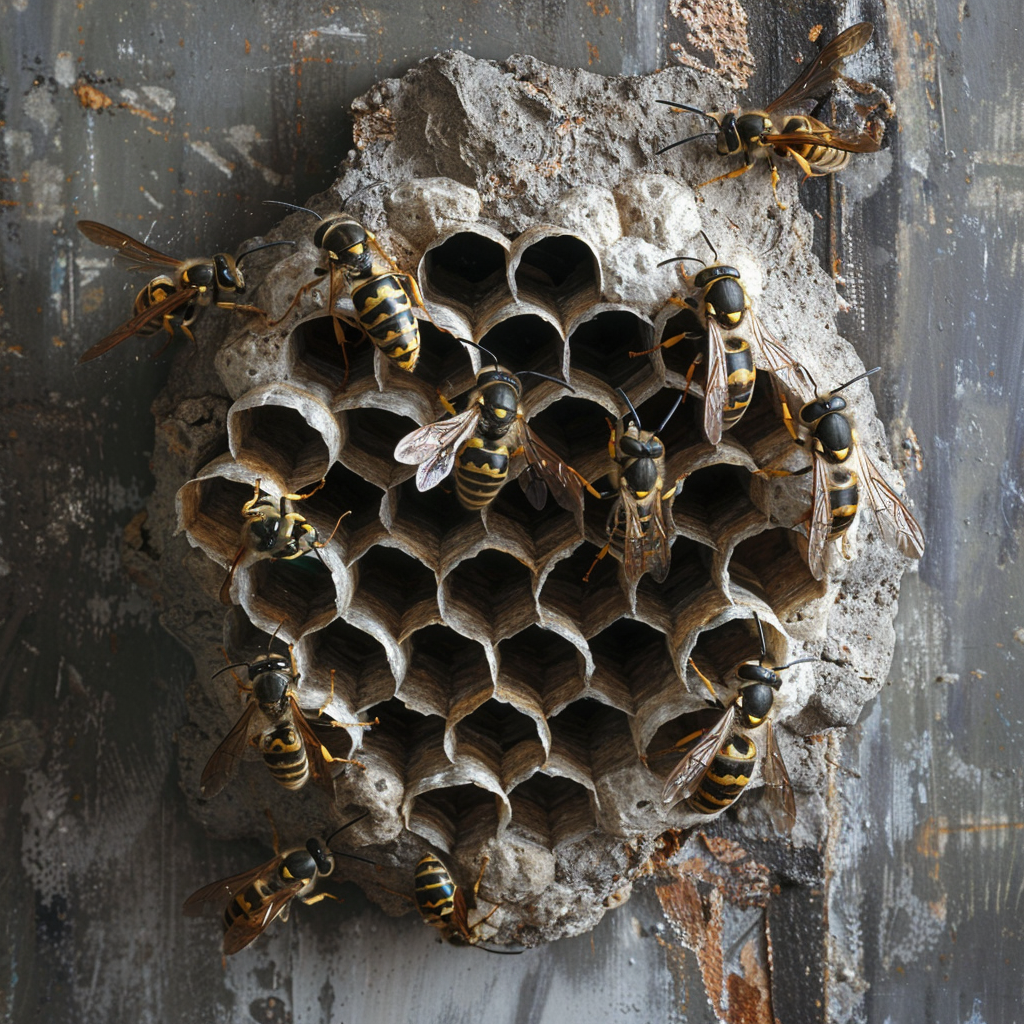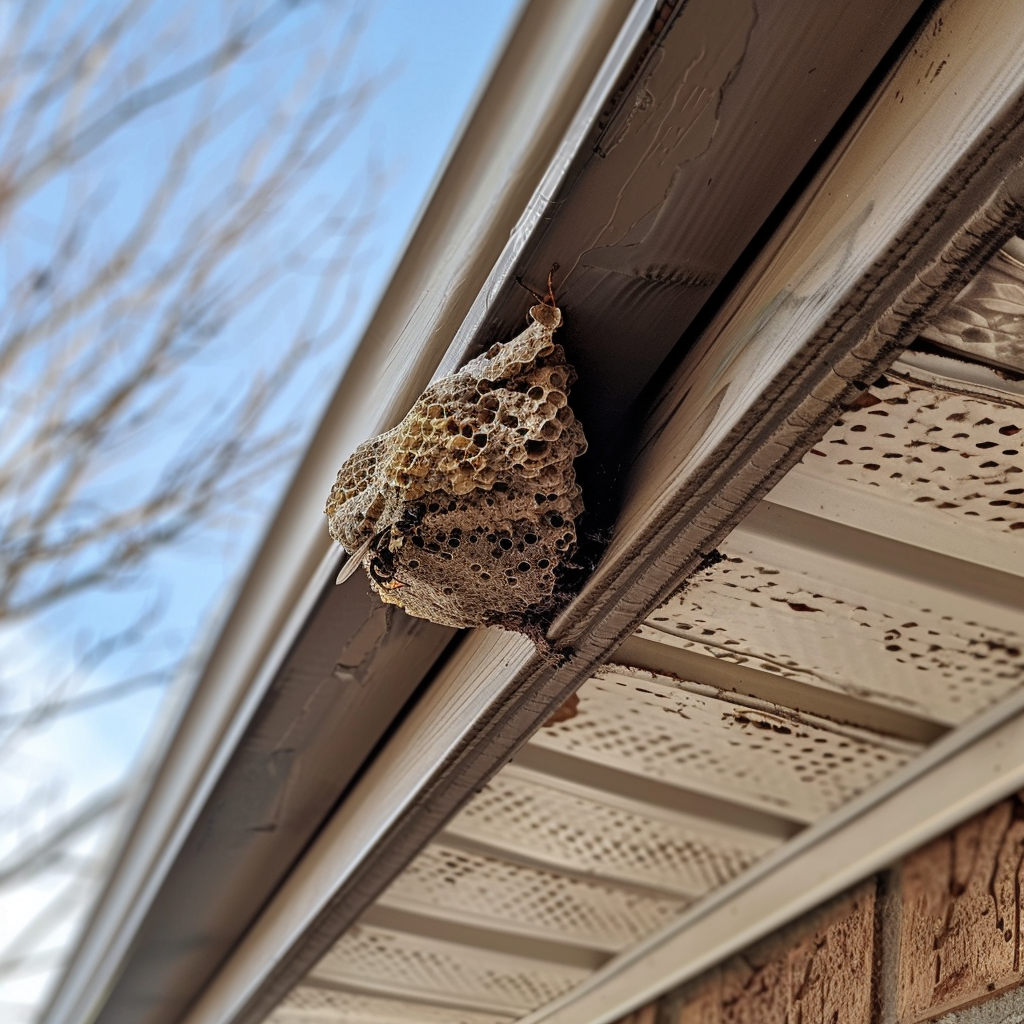
Are you tired of the constant buzzing and fear of getting stung every time you step into your backyard? Say goodbye to your wasp woes with our effective wasp control methods. We’ve got you covered whether you’re dealing with aggressive yellow jackets or menacing paper wasps. Our expert techniques will help make your home wasp-free, ensuring a safe and peaceful environment for you and your family.
Don’t let wasps ruin your outdoor fun or invade your home. Take control of the situation with our practical advice and regain your peace of mind. Let’s buzz off those unwanted guests for good!
Understanding the behavior and habits of wasps
Understanding wasp behavior and habits is essential to effectively controlling them. Wasps are social insects that build nests and live in colonies. They are most active during the warmer months, particularly in late summer and early autumn, when their populations peak. Wasps are attracted to sweet foods and beverages and become more aggressive when their nests are threatened.
A key characteristic of wasps is their ability to sting multiple times, unlike bees, which can only sting once. This makes them a greater nuisance, especially if they have established a nest near your home. Wasps can build nests in various locations, including trees, bushes, eaves, and underground. Identifying their nesting sites is crucial for adequate control.
Wasps are territorial creatures, and their behavior is important to note. If you encounter a wasp, it is best to remain calm and avoid making sudden movements. Swatting at a wasp or running away may provoke an attack. Understanding the behavior and habits of wasps will help you devise effective control strategies without putting yourself at risk.
Utah has many wasp species. The most common wereps are yellowjackets, hornets, and paper wasps. Each requires unique wasp removal and pesticides to rid your property of them.
The dangers of having wasps in your home
Having wasps in your home poses several dangers to your property and well-being. While wasps are beneficial insects in nature, as they help control other pests, they can become a nuisance and pose risks when establishing nests near human activity areas. Here are some of the dangers associated with having wasps in your home:
- Stings and Allergic Reactions: Wasps are known for their painful stings, which can cause swelling, pain, and itching. For individuals with allergies, wasp stings can trigger severe allergic reactions, including anaphylaxis, which requires immediate medical attention.
- Property Damage: Wasps can damage your property by building nests in or around your home. They can create unsightly nests on walls, roofs, and other structures. Additionally, their chewing behavior can damage wooden structures and furniture.
- Fear and Anxiety: The presence of wasps can cause fear and anxiety, especially for individuals who have had previous negative experiences with them. This fear can limit outdoor activities and restrict the use of certain areas of your home.
- Food Contamination: Wasps are attracted to sweet foods and beverages. If they are present in your home, they can contaminate your food and drinks, making them unsafe for consumption.
Now that you know the dangers of wasps, it’s time to explore effective wasp control methods to eliminate them from your home and ensure a safe environment for you and your family.
Wasp control methods – natural and chemical options
Various methods are available for controlling wasps, ranging from natural remedies to chemical options. The method choice depends on the infestation’s severity and your personal preference. Here are some effective wasp control methods:
Natural Remedies to Kill Wasps and DIY Wasp Control Techniques
- Wasp Traps: Creating homemade wasp traps is an effective way to catch and remove individual wasps. This involves using sweet baits, such as fruit or sugary water, to attract the wasps into a container they cannot escape. Once trapped, you can safely release them away from your home.
- Peppermint Oil: Wasps are repelled by the strong scent of peppermint oil. Mixing a few drops of peppermint oil with water and spraying it around potential nesting areas can deter wasps from establishing nests near your home.
- Soap and Water Solution: A dish soap and water mixture can kill individual wasps. Fill a spray bottle with the solution and spray it directly on the wasp. The soap disrupts the protective coating on the wasp’s body, causing it to dehydrate and eventually die.
Chemical Options to Kill Wasps
- Wasp Killer Sprays: Wasp killer sprays contain insecticides that quickly kill wasps on contact. They are available in aerosol cans and can be sprayed directly onto the nest or individual wasps. Following the product instructions carefully and taking necessary safety precautions is important.
- Dust Insecticides: Dust insecticides are effective for controlling hidden or hard-to-reach nests. These powders can be applied directly into wall voids, attics, or other areas where wasp nests are suspected. The dust adheres to the wasps’ bodies and is carried back to the nest, eliminating the entire colony.
It’s important to note that when using chemical options, safety must be prioritized. Always wear protective clothing, such as gloves and goggles, and follow the instructions provided by the manufacturer. If you are unsure about using chemical options or have a severe infestation, it is recommended that you seek professional assistance.

How to Identify Wasp Nests and When to Call a Professional
Wasp nests are found around your property, including trees, bushes, eaves, and even in the ground. Identifying these nests is crucial for effective wasp control. Here are some key signs to look out for:
- Increased Wasp Activity: A nest is likely nearby if you notice a sudden surge in wasp activity around a specific area. Look for an unusually high number of wasps flying in and out of a particular spot.
- Visible Nest: Some wasp nests, especially those built by paper wasps, are easily visible. These nests are usually umbrella-shaped and can be found hanging from tree branches, under eaves, or in other protected areas. If you spot a nest, approach cautiously and maintain a safe distance.
- Wasp Traffic Patterns: Observe the flight paths of wasps leaving and returning to their nests. This can give you clues about the nest’s location. Watch for wasps flying in a straight line or following a specific route repeatedly.
If you’re unsure about the location or size of the nest, it’s best to call a professional wasp control service. They have the expertise and protective gear necessary to handle wasp nests safely. Attempting to remove a nest on your own can be dangerous, especially if you have allergies or are dealing with aggressive wasp species.
Remember, prevention is always better than cure. Regularly inspect your property for signs of wasp activity, especially during the warmer months when wasps are most active. By catching the problem early, you can avoid a full-blown infestation and minimize the risk of stings.
Preventing Wasp Infestations in the Future
Prevention is key to keeping your home wasp-free in the long run. Here are some preventive measures you can take to deter wasps from invading your property:
- Seal Entry Points: Inspect your home for gaps or openings that could serve as entry points for wasps. Seal cracks in walls, windows, and doors using caulk or weatherstripping. Please pay special attention to areas where utility pipes enter your home, as wasps can often find their way through these openings.
- Keep Food and Trash Secure: Wasps are attracted to food sources, so keeping your outdoor eating areas clean and secure is essential. Keep all food and drinks tightly sealed and promptly clean up any spills or food debris. Additionally, ensure your trash cans have tight-fitting lids to prevent wasps from scavenging for food.
- Trim Vegetation: Wasps often build nests in shrubs, trees, and overgrown vegetation. Regularly trim and maintain your landscaping to minimize potential nesting sites. Be cautious when pruning, as disturbing an active nest can provoke the wasps and put you at risk of stings.
- Remove Standing Water: Wasps are drawn to water sources, especially in hot weather. Empty any containers that collect water, such as buckets, bird baths, or pet water bowls. By eliminating these water sources, you can discourage wasps from lingering around your property.
Hiring a Professional Wasp Control Service
While DIY methods and preventive measures can be effective for small-scale wasp control, sometimes it’s best to leave the job to the professionals. If you have a large nest, multiple nests, or are dealing with particularly aggressive wasp species, it’s safer and more efficient to hire a professional wasp control service.
At Columbia Pest Control, we provide professional wasp control services throughout Utah. Our trained experts have the necessary knowledge, experience, and protective equipment to handle wasp infestations effectively. We can safely remove nests, treat the affected areas, and provide long-term solutions to prevent future infestations.
Wasp Control Methods That Work!
Don’t let wasps take over your home and outdoor spaces. With the right knowledge and techniques, you can effectively control wasp infestations and enjoy a wasp-free environment. Remember to identify wasp nests and know when to call a professional for assistance. If you choose to tackle the problem yourself, try DIY methods like wasp traps, soap and water solutions, or peppermint oil sprays. Combine these techniques with preventive measures to keep wasps at bay in the future.
However, if the infestation is severe or you’re dealing with aggressive wasp species, call our professional wasp control service. We have the expertise and resources to handle the situation safely and effectively.
Take back control of your home and outdoor spaces by implementing these effective wasp control methods. Enjoy a peaceful and wasp-free environment all year round. Buzz off, wasps!
